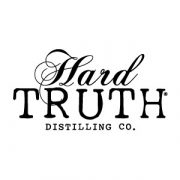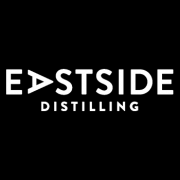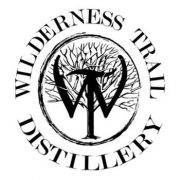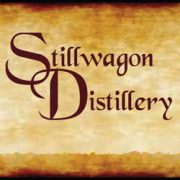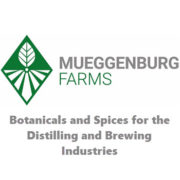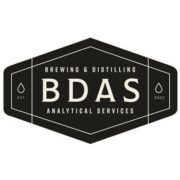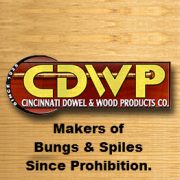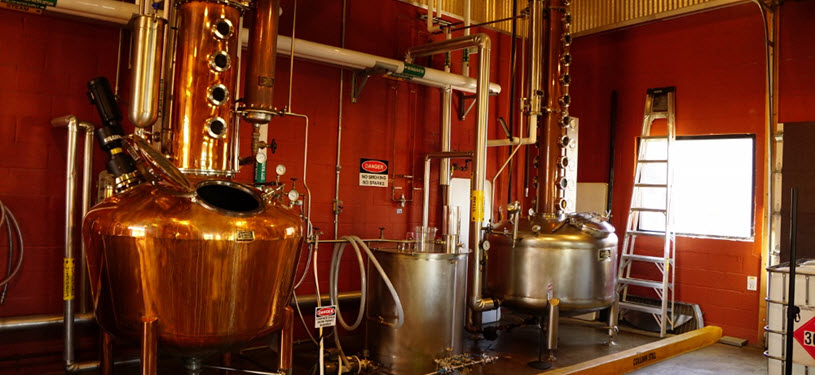
An evolution in consumer’s tastes and the continued growth of craft brewing has led to one of the newest trends in the beverage-making industry: craft distilleries. Craft distillers work to enter the spirits world by creating a product, or products, that are different from everything we’ve had before, or at the very least put a spin on a classic spirit. Barrel aged gin, bourbon made with smoked grains; the list goes on and on.
Most compare the current craft spirits boom to the evolution of craft brewing that started in the 70’s. Small, independent breweries are “easier” to start because distilleries have more building safety and handing issues than breweries do, spirits cost more to produce, and distillers have to tear through more red tape and regulations than brewers. But, these difficulties aren’t slowing the growth of craft distilling.
Don’t let a little red tape deter your dream…
What are Craft Distilleries?
As the popularity and practice of craft distilling has grown in the spirits world, so has the debate about how to define what a craft distillery is and what is not a craft distillery.
Self-proclaimed craft distilleries are usually small and independently owned and operated enterprises producing spirits in small quantities. We’re talking about the difference between a craft distillery making a couple of barrels a week versus a larger producer making a couple barrels an hour, or even a couple barrels a minute. These distillers aim to create high quality products, but their growth goals vary. Some simply want to supply spirits to their local community or region while others want to compete with the industry giants at the national level.
Legally, there is no need for an official definition of “craft” in the distilling world; any laws that would benefit a craft distillery would generally benefit a larger producer too. That being said, the industry itself is the driving force behind defining the term “craft.”
Those who refer to themselves as craft distillers generally want this defined so consumers know what size producer they’re buying their spirits from. They want them to know they are buying from a local family or small partnership, not an industry giant. The American Craft Spirits Association requires their members to produce fewer than 750,000 proof gallons a year, but aside from a couple of associations, there is no industry recognized, or legal definition, of the term “craft” when it comes to distilling.
In short, a craft distiller is someone who makes fewer products than the “big guys”, but right now the jury is out on how much product a distiller has to make before they move out of the “craft” category.
With the Current Boom, Is There Still Space for more Craft Distilleries?
Copper Sea Distilling’s 2015 white paper shows the number of craft distilleries entering the industry has doubled every year from 2009 to 2015. The current exponential growth rate means we are going to see more and more craft distilleries nationwide in the years to come.
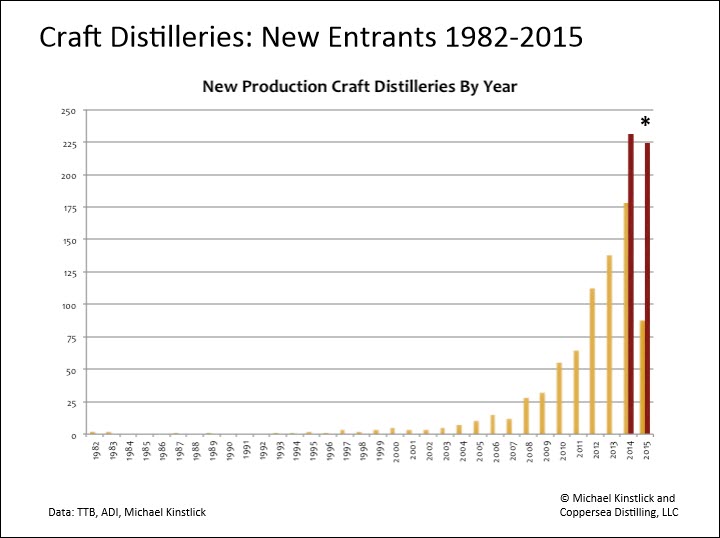
All 50 states are now home to small-scale, craft distilling. Many states have fewer than 10, while the leading states have anywhere from 50 to150 TTB permitted small distilling operations. In some states, there is less red tape standing between hopeful distillers and opening their distillery than in others, which is why states like California, Washington and New York have issued so many more permits than states like Arkansas, North Dakota and Mississippi.
While the point of entry might be harder depending on which state you’re in, there’s still plenty of room for more distilleries. If you look at our friends in the brewing industry, more and more open each year. While the number of breweries closing each year is higher than it used to be, there is still plenty of room for new players who know how to find their niche and create a customer base where they decide to open.
Should I Open My Own Distillery?
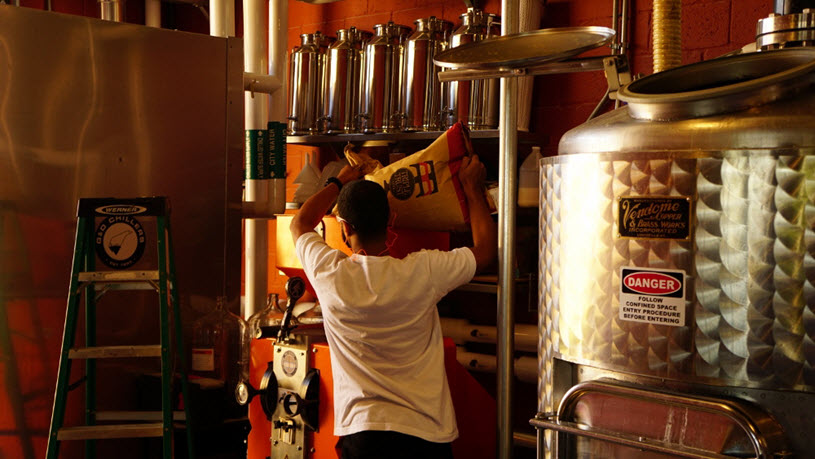

The short answer is, “Yes.” But you have to be honest with yourself and know what you’re getting into. Distilling requires hard physical labor, lots of paperwork, regular inspections and keeping your operation up to code. It is not easy.
A key ingredient all distillers need to succeed in the distilling world is passion, an underlying motivation to push you throughout the distillery construction and spirits-making process. Ask any distillery out there, it took twice as much time and money to open than they thought. It can be a very rewarding endeavor, but the reward won’t come without some heartache and a lot of sleepless nights.
A passion for the spirits you will be producing and the reason behind your inspiration will give you a light on the dark days where you’ll be working 14 plus hours a day trying to keep everything moving forward and up to code.
Without passion, surviving and thriving in the distilling world is tough to say the least.
How Much Money Do I Need to be Successful?
Asking how much money you need to open a distillery is like asking how much money you need to buy a car, it really depends on what type you’re looking to buy. You can get into a 10-year-old subcompact sized car pretty cheap, but it won’t hold much, perform very well, and may need a lot of costly maintenance. So the first thing you need to ask yourself is,
- What do you want to make and
- How much of it do you want to make.
Then you need to build a very comprehensive business plan based off of the answers to those two questions. From that you’ll know how much money you’ll need to start your distillery.
Notice we didn’t ask “How much money do I need to open a distillery.” Opening a distillery is one thing, being successful is another story, a story we focus on.
What to Do
If you happen to be in a financial position that you can pay for your distillery out-of- pocket, congrats, but for the rest of us this means getting loans and investors. With a good business plan you’ll be in a good position to approach both. If you don’t have the contacts to find investors you may need to employ a consultant to help you identify people looking to invest in a distillery.
Crowd funding has been a way some distilleries have raised some startup capital, but never entirely, and even crown funding campaigns with popular master distillers attached only raised a small portion of what they were asking for.
What Not to Do
But whatever you do, do not cash in your retirement or Johnny’s college fund to open a distillery; you’ll just be adding undue stress on yourself and the business.
In short you’re going to need to be well off or be able to knock on a lot of doors and ask for money.
What Advice Do You Have for Me?
Talk to a distillery owner before you get started, in fact talk to many owners, as many as you possibly can, everyone we’ve met in this industry is more than happy to share their experiences. And, take some classes so you know what you’re getting into. Our Moonshine University 5-Day Distiller Course is the best out there to show anyone the breadth and depth of the industry and paint a realistic picture of what it’s like to open, operate, and run a distillery.
Moonshine University offers technical training and business management education for start-ups, industry professionals, and those looking for careers in the distilling industry. Our courses are designed and taught by distillery operators, industry insiders, and world-renowned master distillers. Learn from the best of the best, from distillers of the world’s most successful brands to owners and operators of the leading craft distilleries.
View all Moonshine University Courses here.
Call Moonshine University now at 502-305-8596 to get the spirits journey you’ve been dreaming of going!
Still Have Questions? Ready to Get Started?
Contact us at 502-305-8596 or email at registrar@moonshineuniversity.com
What is BrandScape? BrandScape is a way for product and service suppliers to talk directly to our audience. If you would like to learn more about BrandScape, please email Info@DistilleryTrail.com.

